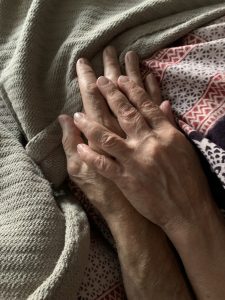“I think you need a haircut,” Jean said. Usually I respond, “No, I’m good for another few months.” This time I said, “Good idea,” because I like the idea of getting ready for radiation; to do it in a ceremonial way, including trimming my hair and my beard, taking care with what clothes to wear, praying to do it well.
The next day would be the “planning appointment” at radiation oncology. I knew there would be a CT and I would get some tattoos to guide the radiation team when it’s time irradiate me. It felt a lot like I would be going out on a long patrol that would start that next day and end sometime in the distant future. Like most other patrols, there would be casualties – some would die, some would be wounded. I was hoping it still ain’t me. 
If that simile isn’t clear enough, it’s like this: let’s say it’s a patrol or operation with 100 troops going out/100 patients getting this sort of treatment. 85 of the troops will make it back/85 of the patients will be fine. Of the 15 troops who don’t make it back, some will die and some will be wounded. Of the 15 patients who are not fine, some will die and some will have further treatment, which will likely be increasingly difficult. Pretty good odds in the world of lung cancer.
There were elements of flashback to the planning appointment. When I was working in hospice and with refugees, I had associates who were in radiation oncology and I’ve spent many hours with refugees and others (including my Mom) in the waiting rooms and cancer treatment areas in Parkland, Presbyterian, Baylor, and M.D. Anderson. So a waiting room with sick people was familiar territory. As usual I felt a kinship with the people who worked there, regardless of their roles. We’re all playing in the band.
Some years ago in Old East Dallas I came across a woman with a ghostly sort of appearance. She had advanced cancer and a difficult past. I helped her with various things, as did my mate in the streets, Martin. One day…
I was taking her to radiation oncology at the county hospital (Parkland Memorial). I’d arranged for a translator from the Multicultural Center to accompany us to explain palliative radiation, which is kind of a difficult concept for someone who doesn’t speak much English. I had the woman in my truck and we went by the center to pick up the translator. I went in and in the conference room I found 3-4 people – including the translator – folding origami cranes. The director of the center told me the translator couldn’t come with the lady and me because they had to fold the cranes for an event at the area peace center. I was literally dizzy with rage. But I didn’t say anything – just left.
Radiation oncology was down the usual endless series of subterranean hallways and doors with little signs saying things like D-1572. The waiting room had the usual complement of sick, pale people. I stayed there while they took the lady through the double doors into the treatment area. There was a little TV on a little table in a corner and Mrs. Doubtfire was playing in the VCR. I’d never seen it before and to me it was one of the funniest things I’d ever seen, which was weird, because I was in a very unfunny place. So I was trying not to laugh, but I finally did. Hard. It seemed to be okay.
Ultimately the lady went back to her home country to die. She took a good stash of dilaudid with her. I hope it was enough.
Before she left, she and her daughter took me to a kind of blue-collar buffet for a thank you/goodbye dinner. It’s still sweet and poignant to me.
This radiation oncology unit where I am now is not the same as the one where I saw Mrs. Doubtfire. They move me through the process professionally, efficiently, and in a nice way. No six hour wait! The oncologist has brilliant credentials and experience. What more could one ask for? We’ll see how it all turns out.